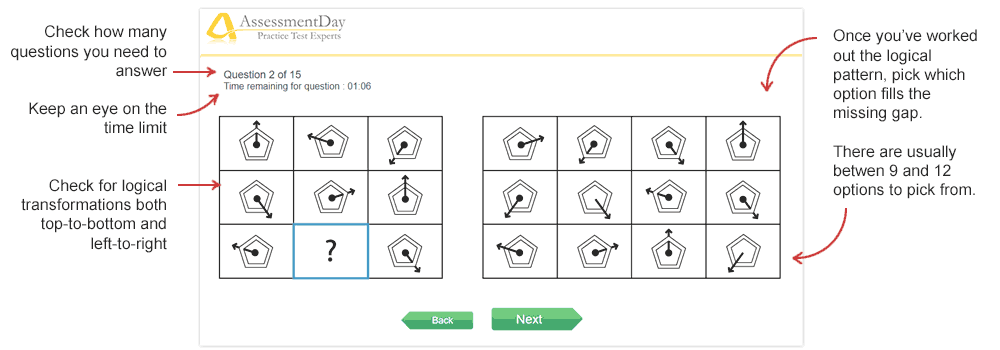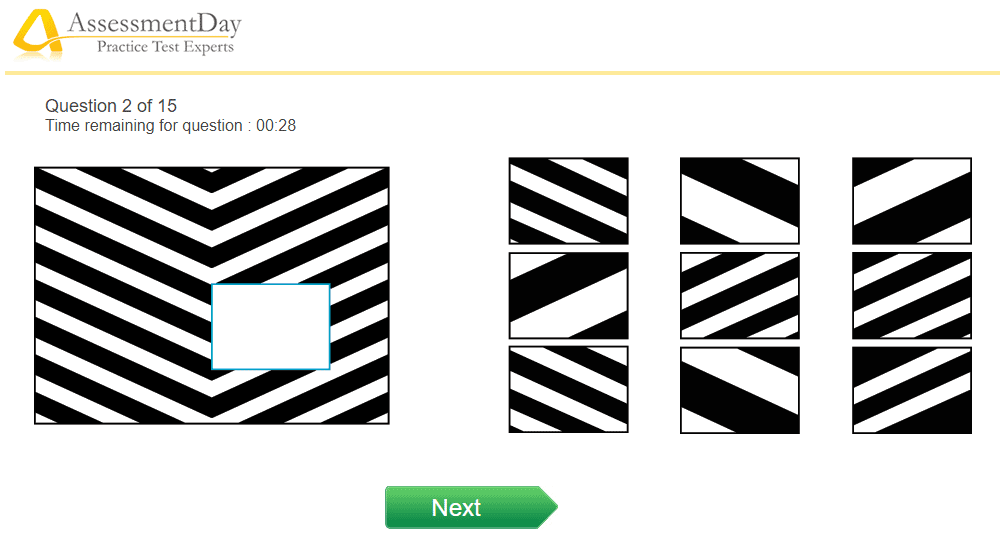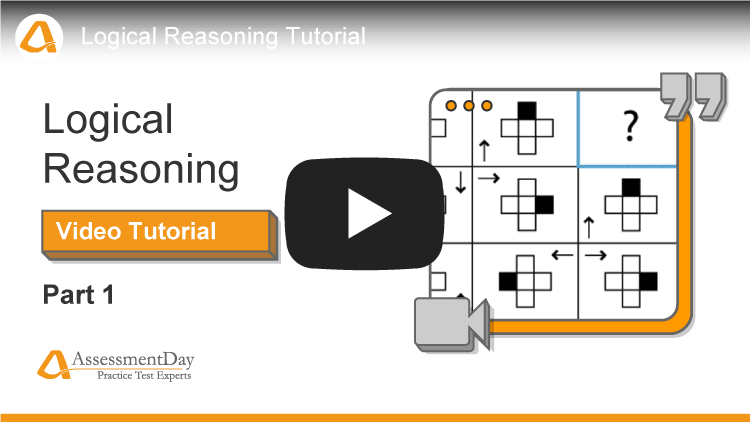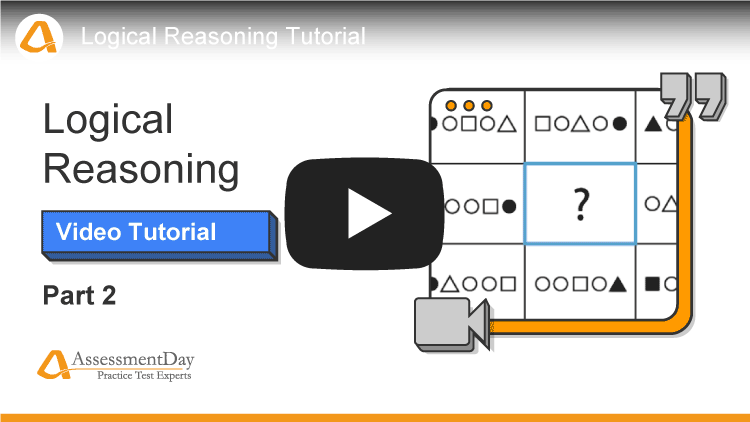Logical Reasoning Tests
Practice tests, solutions, and tips to help you pass employers' logical reasoning tests.



Updated:
What is a logical reasoning test?
A logical reasoning test is used measure a candidate’s problem solving ability. They assess the ability to come to conclusions based on logic. You are presented with a series of shapes and are required to find patterns and rules to help you find the correct answer. These tests may be encountered for any position at any level of recruitment, but they may be particularly common when recruiting for positions which require significant problem solving ability or higher use of logic.
Page contents:
Jump to:What is an example of logical reasoning?
Here are screenshots of our logical reasoning tests to understand what an example question involves:


Looking to hire?
We recommend Test Partnership for companies seeking reliable hiring tests.

How AssessmentDay can help with logical reasoning tests
At AssessmentDay, we have a suite of logical reasoning tests designed to help you excel when it matters most. By practicing with our tests, you'll sharpen your skills, learn from past mistakes, and boost your confidence with every attempt. Our platform lets you experience the real test environment—complete with time limits and authentic layouts—so you're fully prepared, not anxious, when it comes to taking the real thing.
Candidates who practice consistently with AssessmentDay gain a clear advantage, reducing nerves and dramatically improving their performance compared to those taking the test for the first time. If you want to give yourself the edge, our practice platform is the perfect solution.
Logical Reasoning Video Tutorial - Part 1

Free practice logical reasoning test
Free Logical Reasoning Test
FreeThis free shortened logical reasoning test contains 10 questions and has a time limit of 70 seconds per question.
Logical Reasoning Test 1
Premium- 12 questions
- 14 mins
Logical Reasoning Test 2
PremiumLogical Reasoning Test 3
PremiumLogical Reasoning Test 4
PremiumLogical Reasoning Video Tutorial - Part 2

Different types of logical reasoning
There are numerous types of logical reasoning test, and many of these are used interchangeably. These tests tend to be similar in their layout and methodology, but with subtle and important differences.
Survey results
We analysed a sample of logic-based tests, to find the most common terms/most popular type was: Inductive reasoning

Here is a breakdown of the most common logical ability tests:
- Inductive reasoning: Inductive reasoning is the ability to reach general conclusion based on perceived patterns observed in specific events. Inductive logic is often used in everyday life and is therefore practical to a work place environment. In these tests candidates will be provided with a series of diagrams with an evident pattern. Candidates will need to identify the pattern in the sequence of diagrams and select the next diagram in the sequence.
- Deductive reasoning: Deductive reasoning involves a general rule or principle that leads to a specific conclusion. These tests will evaluate and measure a candidate's ability to make logical arguments and draw sound conclusions based on provided data, as well as identify flaws in a piece of information. As a result this is a useful tool in selection procedures as this type of reasoning will be used in the workplace. This type of reasoning will often be used in verbal reasoning tests and numerical tests, and is therefore very likely to be encountered in recruitment processes.
- Abstract reasoning: Abstract reasoning, also known as conceptual reasoning measures your lateral thinking ability. In these tests candidates will be tested on their ability to identify relationships, patterns and trends. Candidates will be provided with a series of images that follow a logical sequence or underlying rules. This may include following a rule in a sequence, identifying a code or finding a missing diagram.
- Diagrammatic reasoning: Diagrammatic reasoning is a specific form of abstract reasoning. Tests which assess this ability will typically show a flowchart of diagrams and symbols, with an input and an output. Candidates will need to identify which inputs effect diagrams, and therefore generate a specific output based on those rules.
- Critical thinking: Critical thinking tests are a type of verbal critical reasoning task which assesses various different types of logical reasoning in arguments, assumptions and conclusions. Typical logical abilities tested include analysing arguments, making inferences and evaluating conclusions.
The most common logical reasoning tests used by employers
Did You Know
Different test publishers use different names for their assessments. The term logical reasoning is used by TalentQ. Other companies may call their test abstract, inductive, or diagrammatic reasoning. It is good advice when being asked to sit a logical reasoning test to speak to the person who invited you and ask for a bit more detail; they may even give you a few example questions so you know what to expect.
Our study asked candidates about their logical reasoning test experience, in doing so we managed to find the most popular test publishers from our sample:

- 1. Talent Q Elements Logical Ability - the important feature of these tests is that they are adaptive. That is to say the difficulty of each question is automatically determined by your performance in the previous question. So the questions become more difficult as you progress in order to quickly find your level of logical reasoning ability. There are typically 12 questions to these TalentQ logical tests and a time limit of 75 seconds per question.
- 2. Kenexa Logical Reasoning - this test published by Kenexa is actually very similar in style to what SHL call an inductive reasoning test. They are effectively the same thing; the candidate is asked to select which diagram fits within the given series from a choice of five options. Typically Kenexa will give the candidate 20 minutes for 24 questions for their logical reasoning test.
- 3. Ravens Progressive Matricies (Ravens APM / Ravens SPM) - The grid-style of symbols each following a pattern is also used in the Ravens Progressive Matrices assessments. With Raven's logical test, there are two levels of this test: Advanced Progressive Matrices (23 questions, 42 minutes) and Standard Progressive Matrices (28 questions, 47 minutes). Our logical tests are suitable for Raven's APM-III and Raven's SPM tests, you can alter the time limit with of our tests to create a more authentic experience.
Start practising quality tests with a free account
Practice makes perfect
- Learn from detailed solutions
- Track your progress

Logical reasoning test advice
Although all tests evaluate a specific logical ability, or set of abilities, there are general strategies which can be applied to ensure maximum performance in a logical reasoning test.
Here is a list of useful tips and advice for logical reasoning tests:
- Stay calm: - Logical reasoning tests of all kinds can be nerve racking, particularly ones which are time limited. As a result it is important to stay calm as to allow optimum performance during your exam. A small amount of anxiety can be a performance booster, maximise focus and therefore performance. However, serious test anxiety can severely hamper performance. Proper practice, enough sleep the night before and deep and regular breathing can all help settle your nerves, and perform to your best on the day of your test.
- Research the type of test: - Learning as much about the test beforehand can help you dive straight into the test once you have received it, saving you time. Similarly after researching the test, and the logical abilities which it assesses, can help you hone these skills and ensure you demonstrate the particular aptitude required for the test, optimising your performance.
- Clarify what type of test: - If an employer states that you will need to undertake a logical reasoning test, it is important to gauge what type of logical reasoning will be tested due to the broad nature of logical reasoning. Don’t be afraid to ask for clarification to identify which logical reasoning test will be used, and which logical reasoning skill will be tested as this information will be invaluable for your pre test preparation.
- Figure out the answer first: - A general tip for logical reasoning tests is to figure out the correct answer/sequence/rule before looking at the multiple choices. This way once you have an idea in your head of the correct answer, you can simply pick it out. If you look at the multiple choice answers first, you will be more inclined to pick the answer which best looks like the correct answer, rather than take the time to evaluate it logically. Your logic will be subject to more bias if you base your answer on which answer seems correct on face value, instead of evaluating it using the logical skills being tested.
- For more advice on logical reasoning tests, check out our logical reasoning tips where we go through an example question and give you advice on how to pass logical tests.